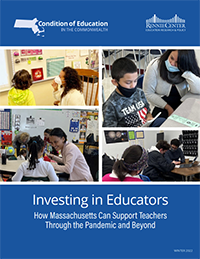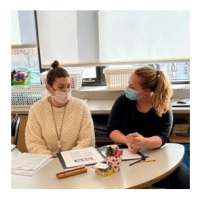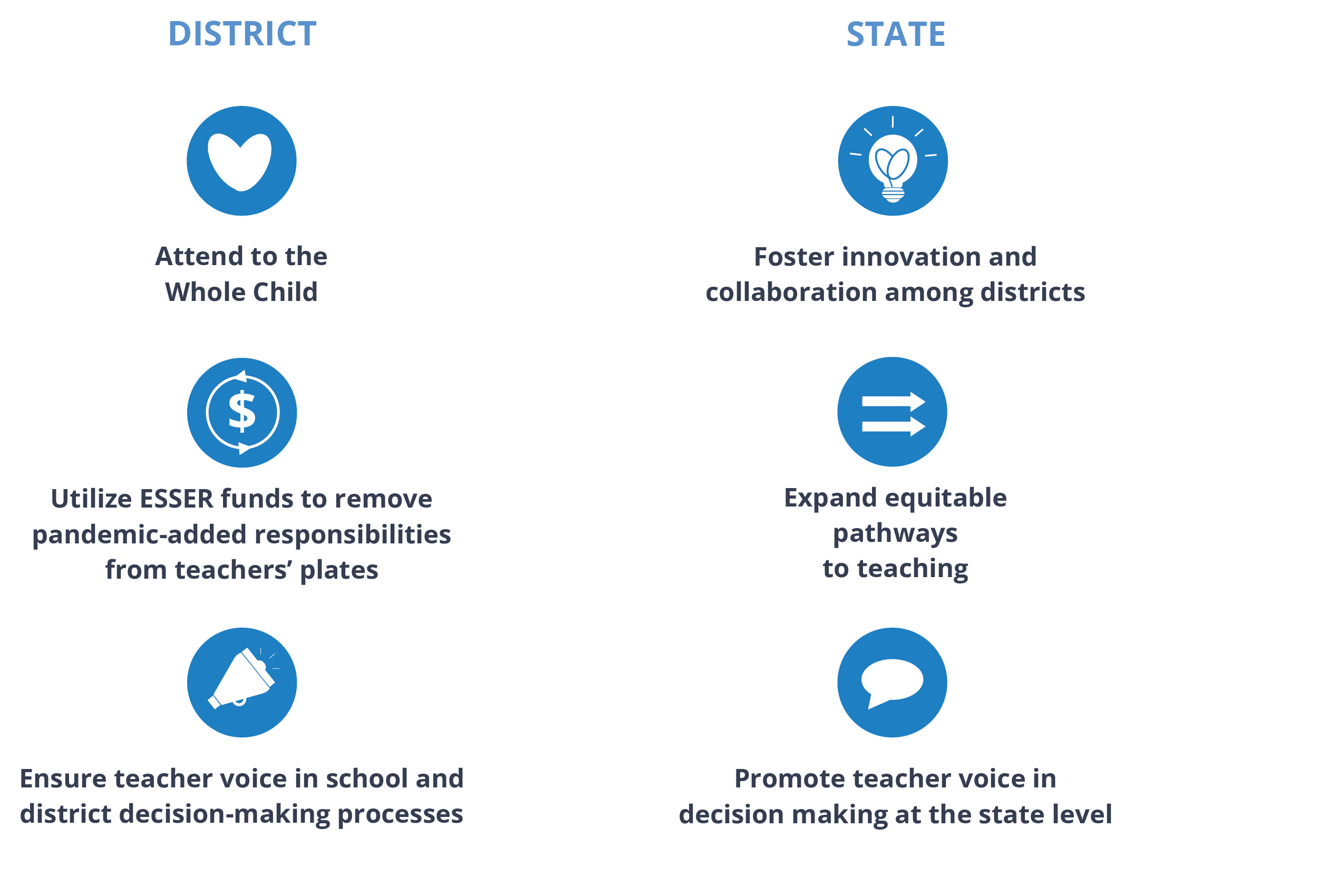A key piece of our Condition of Education in the Commonwealth report, the Action Guide provides research-informed recommendations for statewide actions—policies, investments, and expansion of best practices—that have potential to address performance gaps and contribute to broad improvement in student outcomes. In our recent Condition of Education Action Guides, we've called on the Commonwealth to consider education more holistically, noting that education encompasses more than academic learning.
 2022 Action Guide | Investing in Educators: How Massachusetts can Support Teachers Through the Pandemic and Beyond
2022 Action Guide | Investing in Educators: How Massachusetts can Support Teachers Through the Pandemic and Beyond
This year's report highlights the critical need for our education system to better support teachers as they navigate the COVID-19 crisis and adapt their practice to be more trauma-sensitive, culturally responsive, and innovative. We offer recommendations for investing in teachers right now as well as putting a system in place to offer long-term support for current and future educators.
A Time for Change
Over the past two years, the expectations placed on teachers have grown exponentially. As students face the instability and trauma of life in a pandemic, educators have become even more critical in supporting and facilitating students’ mental health and social-emotional development, as well as their academic success. These challenges are exacerbated by the need to adjust to changing public health protocols and help students contend with lost learning time. In spite of the odds, the education workforce, from early educators to K-12 teachers to college and university professors, has gone above and beyond to support the Commonwealth’s students during this turbulent time.
But educators are stretched thin. Leading students through uncertain times has caused unprecedented levels of isolation, stress, and burnout. Research shows that one in four K-12 teachers considered leaving their job at the end of the last school year. So, as the pandemic continues into 2022, there is an urgent need to better support teachers.
At this moment in time, it is critical to help teachers navigate these challenges not by putting more on their plates, but by bolstering structures designed to assist them. Adult care and supports are essential to any COVID recovery plan, both to survive the current moment and to set a path for building a more equitable and effective system moving forward.
Immediate Supports
In the wake of COVID-19, educators are being pulled in many directions, struggling to navigate conflicting messages about making up for lost learning time, taking care of kids' ever-growing non-academic needs, and returning to “normal” as quickly as possible. Teachers need working conditions that support them in navigating these tumultuous times. This can be done by fostering a culture of support and maintaining focus on a core set of strategies for responding to the current crisis: prioritize and strengthen trauma-sensitive approaches to learning that acknowledge and attend to the turmoil experienced by all students; continue to cultivate schools and classrooms that are welcoming, inclusive, and culturally responsive where all students feel a sense of belonging and purpose; and remain flexible and willing to pursue innovative solutions to unexpected challenges. This report looks at how continuous support for teachers is necessary and achievable, detailing strategies like making space for purposeful collaboration and amplifying just-in-time tools and resources.
Ongoing Supports
Receiving support through professional learning and other growth opportunities can help teachers recognize areas for improvement in their practice and alternative methods for delivering content to their students. Yet, as teachers continue to face the effects of the COVID-19 pandemic, professional learning experiences may be pushed aside because of limited time or to avoid exacerbating the sense of exhaustion felt across the profession. Without opportunities to explore gap areas in educators’ practice, the greatest challenges facing students, teachers, and families may not be adequately addressed. If educators are not given adequate time and space to engage in meaningful professional learning and receive ongoing support, burnout and attrition may increase. This report details how ongoing support structures should be developed in conversation with teachers in order to tailor an experience that meets the needs they see in their classrooms as well as their own social-emotional and learning needs.
Building a Pipeline
Like current teachers, new teachers entering the field must be prepared to adopt trauma-sensitive, culturally responsive, and innovative approaches to maximize their students’ potential. Teacher preparation programs must adapt to ensure aspiring educators enter changing classroom environments empowered, emboldened, and able to be effective. Evidence indicates that the traditional teaching pipeline—entering college to earn a bachelor’s and/or master’s degree and taking the Massachusetts Tests for Educator Licensure (MTEL) and other relevant tests—does not offer equitable opportunities for all candidates. For example, the financial and personal costs of obtaining higher degrees and taking teaching licensure tests disproportionately affect people of color. Meanwhile, the MTEL itself can present a barrier to entry for candidates of color: 80% of White test takers pass this exam compared to 46% of Black test takers, 58% of Hispanic test takers, and 63% of Asian/Pacific Islander test takers. Collectively, these and other factors have resulted in a disproportionately White teaching force: 81% of all teachers identified as White, while only 55% of Massachusetts students identify in the same way. This report looks at how Massachusetts can rethink our approach to educator preparation. To build an educator pipeline that offers multiple routes into teaching, there must be a deep investment in homegrown talent, a real connection to and grounding in the community, and space for individualized coaching practices. Reevaluating the teacher preparation process and developing exploratory ways to support all kinds of aspiring educators will, in turn, support students of all kinds.
Local Spotlight
 Our report features local districts and organizations doing promising work to support educators. This includes Revere’s Colleague-to-Colleague program, a teacher consultant initiative that provides educators with the space and expertise to tackle immediate and longer-term needs; Great Schools Partnership, which helps schools and districts prepare to be responsive to students whose diversity is increasing at a far greater rate than the adults supporting them; and the Lawrence Working Families Initiative, where parents and community members are trained and supported to become school paraprofessionals and/or classroom teachers.
Our report features local districts and organizations doing promising work to support educators. This includes Revere’s Colleague-to-Colleague program, a teacher consultant initiative that provides educators with the space and expertise to tackle immediate and longer-term needs; Great Schools Partnership, which helps schools and districts prepare to be responsive to students whose diversity is increasing at a far greater rate than the adults supporting them; and the Lawrence Working Families Initiative, where parents and community members are trained and supported to become school paraprofessionals and/or classroom teachers.
Policy Recommendations

